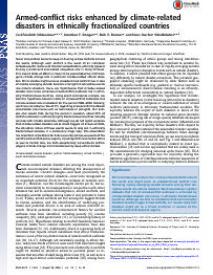Armed-conflict risks enhanced by climate-related disasters in ethnically fractionalized countries
Social and political tensions keep on fueling armed conflicts around the world. Although each conflict is the result of an individual context-specific mixture of interconnected factors, ethnicity appears to play a prominent and almost ubiquitous role in many of them. This overall state of affairs is likely to be exacerbated by anthropogenic climate change and in particular climate-related natural disasters. Ethnic divides might serve as predetermined conflict lines in case of rapidly emerging societal tensions arising from disruptive events like natural disasters.
Here, we hypothesize that climate-related disaster occurrence enhances armed-conflict outbreak risk in ethnically fractionalized countries. Using event coincidence analysis, we test this hypothesis based on data on armed-conflict outbreaks and climate-related natural disasters for the period 1980–2010. Globally, we find a coincidence rate of 9% regarding armed-conflict outbreak and disaster occurrence such as heat waves or droughts. Our analysis also reveals that, during the period in question, about 23% of conflict outbreaks in ethnically highly fractionalized countries robustly coincide with climatic calamities.
Although we do not report evidence that climate-related disasters act as direct triggers of armed conflicts, the disruptive nature of these events seems to play out in ethnically fractionalized societies in a particularly tragic way. This observation has important implications for future security policies as several of the world’s most conflict-prone regions, including North and Central Africa as well as Central Asia, are both exceptionally vulnerable to anthropogenic climate change and characterized by deep ethnic divides
Geachte bezoeker,
De informatie die u nu opvraagt, kan door psychotraumanet niet aan u worden getoond. Dit kan verschillende redenen hebben,
waarvan (bescherming van het) auteursrecht de meeste voorkomende is. Wanneer het mogelijk is om u door te verwijzen naar de bron
van deze informatie, dan ziet u hier onder een link naar die plek.
Als er geen link staat, kunt u contact opnemen met de bibliotheek,
die u verder op weg kan helpen.
Met vriendelijke groet,
Het psychotraumanet-team.
In: PNAS, ISSN 0027-8424 | 113 | 33 | augustus | 9216–9221
http://doi.org/10.1073/pnas.1601611113


